

 |
 |
|
| |
||
|
Vol. 9 No. 17 WE COVER THE WORLD Wednesday February 3, 2010 |
Cargo Security Conference
|
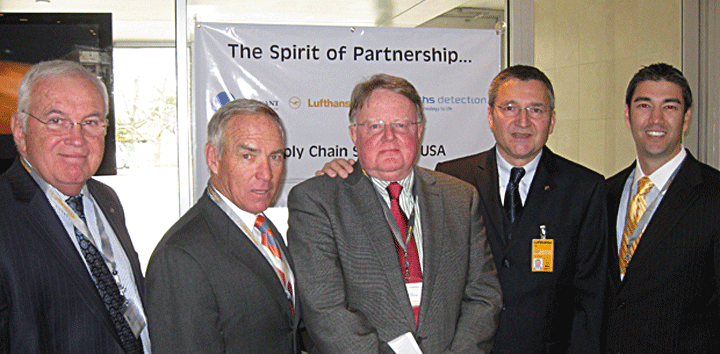 An alliance that makes it possible for everybody in air cargo to be compliant with 100% belly-cargo screening. From left to right, Thomas J. Long, Executive Vice President, Covenant Aviation Security; Gerry Berry, President, Covenant Aviation Security; Klaus Holler, Lufthansa Cargo Vice President The Americas; Harald Zielinski, Lufthansa Chief of Security & Environmental Management and Daniel Martel, Manager Key Accounts, Smiths Detection. |
(New York Exclusive)—The main meeting
room on the first floor at the newly refurbished Lufthansa landmark
New York headquarters was packed to overflowing as the carrier held
its second all-day Air Cargo Security Conference in East Meadow near
JFK International Airport on Tuesday.
Right from the get go it was made apparent
that business as usual would not be the same as that date of August
2010 for 100% belly-cargo screening imposed by the U.S. moves ever closer
to its start up.
Just to bring the full impact of the new
requirement into sharper focus and maybe to quell some impact of “where
do we go from here,” Lufthansa started things by announcing an
unusual partnership that if nothing else, holds open for industry stakeholders
an apparent solution to meeting security mandates at once and long into
the future.
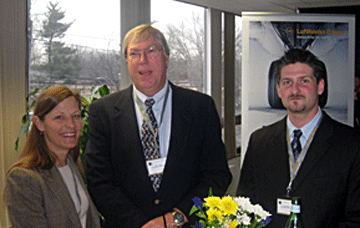 At
the conference, left to right—Debbie Geiger, Manager, export Compliance
& Sea Freight Processes, Mid-America Overseas, Inc.; Klaus Jager,
Corporate Operations Manger, EMO TRANS and Sven Frigger, Manager Corporate
Compliance, EMO TRANS.
At
the conference, left to right—Debbie Geiger, Manager, export Compliance
& Sea Freight Processes, Mid-America Overseas, Inc.; Klaus Jager,
Corporate Operations Manger, EMO TRANS and Sven Frigger, Manager Corporate
Compliance, EMO TRANS.
“Our groundbreaking partnership
provides low-cost, TSA-approved security solutions to air cargo shippers
and freight forwarders, as Smiths Detection, Lufthansa Cargo and Covenant
Aviation Security, LLC, will provide an all-in-one TSA-approved security
solution for the freight forwarding, air cargo shipping and logistics
industry in the United States,” said Klaus Holler, Vice President
the Americas, Lufthansa Cargo.
“With ongoing regulatory developments
and other challenges in the United States, security has become the cornerstone
of all business processes.”
The new accord counts more than 4,000
employees combined operating from facilities strategically located throughout
the U.S.
The partnership will provide both large
and small freight forwarders and shippers with an array of air cargo
solutions.
These services, which include ground handling,
security screening and equipment, warehousing, training and transportation,
will enable shippers and forwarders to meet TSA screening mandates.
Mark Laustra, Vice President/GM of Homeland
Security, Smiths Detection, said:
“Smiths Detection is pleased to
team with Lufthansa Cargo and Covenant.
“We're excited to team up and offer
our clients a simplified, turn-key solution to optimize their business
from transportation and warehouse handling to security screening and
related technological services.’
Tom Long, Executive Vice President of
Covenant Aviation Security, noted:
"As a qualified security screening
services contractor for the U.S. Department of Homeland Security’s
Transportation Security Administration, we look forward to providing
total security solutions for the protection of the nation's airways,
travelers and supply chain.
“Now shippers and forwarders have
access to the end-to-end security solutions needed to meet the TSA’s
mandate in a cost-effective, streamlined way.”
The Lufthansa Security Conference was
a jam-packed affair rolling out one speaker after another in a non-stop
multi-houred effort.
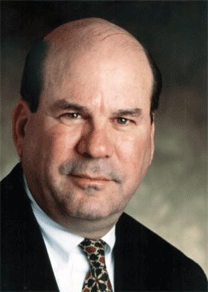
Remembering Ed Kelly, TSA Head of Cargo Security.
At the top as conferees gathered, Klaus
Holler revealed the depth of cooperation and also professional respect
amongst the airline and TSA (although often there are issues to be sure)
offering a touching moment of silence for Ed Kelly, TSA Head of Cargo
Security who died unexpectedly last year right after attending Air Cargo
Americas.
Later setting the table for the day’s
agenda Klaus reached out to the gathering “in the spirit of moving
the industry we all love into the 21st Century.”
“The effort to get air cargo security
right is number one priority right now,” Klaus Holler said.
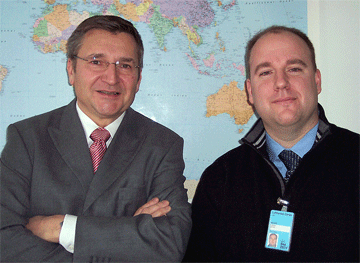
Creating dialogue—Harald Zielinski and Jim LoBello, Head of Security
The Americas. Lufthansa hosted an all day air cargo security encounter
with industry stakeholders and TSA.
Harald Zielinski, Lufthansa
Cargo Chief of Security & Environmental Management is someone who
through sheer force of his determination and dedication toward security
is acknowledged in many quarters as the foremost airline air cargo security
expert in the world today.
Harald noted that one of the key challenges
to get air cargo security harmonized leading up to USA mandated 100%
screening this August “is getting the many governments, both in
Europe and everywhere else on the same page with their different requirements.
“Security is a challenge but it
is also a product, a cost of doing business that must be made efficient
and effective to the benefit of everyone.
“There is much to be done but my
biggest target is for a harmonized security atmosphere around the world.”
Mr. Zielinski noted:
“While we realize a security surcharge
we are seriously putting every effort to making the process better for
our customers and colleagues.
“But all of us need to get on the
same page and to make sure everyone knows what to expect.
“The need is made even more apparent,
since at Lufthansa we carry half of all our air cargo aboard passenger
aircraft.”
Mr. Zielinski raised concern about what
he described as ”low pay given to people involved in security”.
“A key driver to an expanded and
high quality security chain is keeping the best and the brightest security
specialists amongst us by paying them better,” Harald said.
“We have invested huge amounts of
money in our people and equipment and we hope that others are doing
the same thing,” Mr. Zielinski concluded.
Vincent Henry Director/Professor, Homeland
Security Management Institute Long Island University, who was also a
first responder on 9/11 cautioned conferees that “the nature of
terrorism has changed since the World Trade Center attacks."
“Their goals remain the same but
terrorists are refining and updating their processes on a daily basis.
“Bin Laden is no longer the face
of terrorism and terror is no longer a structured organization- but
rather has moved into a diffuse franchise for the global Jihadi movement.
“Security needs to be aware that
the face of terrorism has also changed dramatically—into people
who appear on a global basis as regular folks, who five years ago would
never even have been profiled.
“That’s why we cannot allow
outdated security procedures. We need to continually refine and update
our security practices.
“Air cargo should not take a cookie
cutter solution to security either but rather needs to take an approach
that offers multiple layers that starts with who we hire and how we
examine cargo moving outside and inside the airport environment.
“Security needs to be protean and
adaptable like our enemy.”
TSA’s Doug Brittin put it on the
line
“There are 179 days left and 100%
is 100%. Cargo not screened on August 1st, 2010 will not fly.”
If that sounds like a fist—actually
Mr. Brittin, part of the industry since Emery Air Freight, also said.
“At the onset we were given limited
equipment and we know that the 100% mandate is challenging to the air
cargo environment.
“One solution is our CCSP that now
is empowering shippers to screen cargo, moving the ability for anybody
to screen their own cargo prior to the airport in compliance to their
own needs.
Independent cargo screening facilities
or the “car wash” approach has also worked.
“TSA believes in shared responsibility,
“We have learned and modified our
approach updating qualifying equipment, adding technology.
“When this started we did not know
for example that you cannot X-Ray a skid full of watermelons, because
nothing shows up.
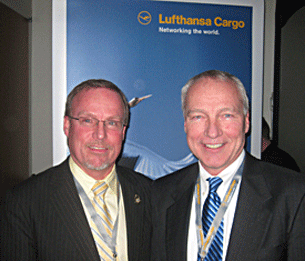 (Left
to right)—Thomas Friedman, Branch Chief Indirect Air Carrier Programs
Transportation Security Administration and Doug Brittin, Manager Air
Cargo Programs, Transportation Security Administration
(Left
to right)—Thomas Friedman, Branch Chief Indirect Air Carrier Programs
Transportation Security Administration and Doug Brittin, Manager Air
Cargo Programs, Transportation Security Administration
“We know that cargo
screening is not like screening passenger baggage.
“The different types of air cargo
have special requirements and we are approaching each one with special
attention.
“There are plenty of options out
there but the U.S. government will not defer the mandated deadline.”
On the hot button topic of how will industry
get to 100% on international inbound cargo?
“A layered approach and also moving
into risk targeting and other procedures is being utilized.
“We are moving to harmonize with
other countries.
“The effort is time-consuming and
in some respects U.S. lawmakers have objected but TSA is convinced
that standardizing procedures is the ultimate goal.
“USA cargo should come talk to TSA
and share ideas and offer suggestions as this inbound process continues.
“As long as our efforts show progress
toward getting on the same page we are hopeful to get the time needed
to harmonize our efforts.”
| Some Questions Directed To TSA Q: Can dogs be used for primary screening? TSA: Yes, when available but shippers need backup. TSA favors private canine resources and is working in that area. Q: Any changes for Envirotainer? TSA: No change—all containers must be screened 100% Aug 1. Q: Will TSA motivate cost sharing for security amongst shippers? TSA: We think cost sharing is a very good point and we are working to convey our feelings to all stakeholders. Q: What about inconsistencies of TSA inspectors. It’s a big problem. TSA: Please send us an email and detail the problem. We should be able to control that. We have zero tolerance for that. In that effort TSA is hosting a TSA webinar for all our inspectors so that they understand the rules and interpretation will be improved. We are also constantly training for updated protocol." |
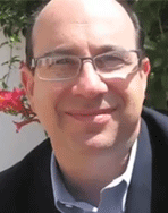 Brandon
Fried, Executive Director Airforwarders Association also saluted the
late Ed Kelly saying:
Brandon
Fried, Executive Director Airforwarders Association also saluted the
late Ed Kelly saying:
“Ed’s legacy is seen in the
many fine people here today from TSA.
“We did not always agree, but he
was always a gentleman.
That said, Fried warned conferees to “fasten
your seatbelt—politics ahead.”
Brandon should know, as someone who trolls
the halls of Congress keeping up the interests of his 200-member association.
“The next 50% mandated compliance
is more like 300% in real terms to meet the challenge.
“One thing for sure, we do not want
government screening our cargo.
“We are the experts—period.
“That’s why we support CCSP.
“At this time there is no machine
that can screen ULDs.
"This mandate
is on the piece level, TSA only has about 104 unique shipper locations
signed up for CCSP.
“We think shippers have pretty well
told us that they expect us to get the job done.”
“So we are looking to form coalitions
with other stakeholder groups to find some government funds so that
air freight forwarders can get screening equipment and become CCSP.
“Forwarders and others, I should
add, would be well served to get out and explain and update their customers
as August 1 approaches.
“The objective is safe skies—air
cargo was the loophole that is being closed by these regulations.
“We just need to work together to
get everyone on the same page.”
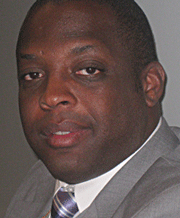 Panalpina’s Vice President Area
Security Manager, USA Charles Morton (right) brought the proposition
that ran through this meeting, of past focus clashing with a flurry
of drivers for change.
Panalpina’s Vice President Area
Security Manager, USA Charles Morton (right) brought the proposition
that ran through this meeting, of past focus clashing with a flurry
of drivers for change.
“The heavy hand of the government
will come down on you if you’re not compliant.
“With all the duplication of effort
going on In the world the wonder is how will air cargo pay for it?
“I am seeing demands from our customers
in our shipping orders saying: 'How will you screen my cargo?' Customers,
while looking for rate reductions are also asking us to screen their
cargo
“As business picks up and volumes
come back, it will put further pressure on the screening processes.
“Impact is being felt industrywide.
“Shippers need to be more involved
in this process.
“Liabilities up and down the cargo
chain need to be thought out.
“Shippers are scared to death. They
come to us as their forwarders looking for answers.
“One thing for certain, this is
an entirely new air cargo business.
“The reality is that more regulation
is certain.
“Panalpina, during one of the worst
business cycles has committed to building a secure atmosphere but we
wonder of the costs and increased demand from TSA, moving ahead.
“One thing needed is open dialogue,
preparing customers for what is coming and also surprisingly, for rules
and regulations already in place.”
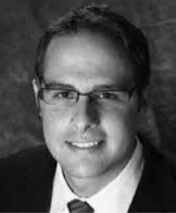 Adam
Salerno, Senior Manager, National Security and Emergency Preparedness,
U.S. Chamber of Commerce (left) said that USC formed a global supply
chain working group that reports need for greater transparency be given
to impact of enhanced security.
Adam
Salerno, Senior Manager, National Security and Emergency Preparedness,
U.S. Chamber of Commerce (left) said that USC formed a global supply
chain working group that reports need for greater transparency be given
to impact of enhanced security.
Speaking from the view of all the cargo
disciplines, Mr. Salerno noted that in large part, politics drove demand
for greater security in the post 9/11 atmosphere.
“We have been pressing Congress
to get money for cargo screening and the silence has been deafening
although funds are plentiful for Sky Marshals and the like.
“These huge bulk shipments cannot
be screened—there is no technology in place.
“The Trucking industry chain of
custody is a huge issue.
“We will have to meet the TSA deadlines
because failure to comply can only further politicize the process.
“We have to make sure the TSO’s
not be allowed to take over the security process.
“CCSP, that we support, is not perfect.
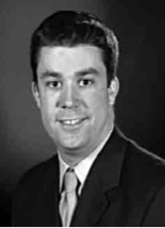 “Audits should be done by TSA, not
third-party providers. Cost should not be borne by the entire industry.”
“Audits should be done by TSA, not
third-party providers. Cost should not be borne by the entire industry.”
“I am excited for HR2200, a bill
currently in the U.S. Congress that would allow for a risk based multi-layered
approach to cargo security.”
Speaking for airports, Carter Morris,
Senior VP Transportation Security Policy, American Association of Airport
Executives (right) lauding the Lufthansa Cargo Security Conference initiative
as “unique” also said that air cargo should stay focused
on compliance.
“I am most worried about another
incident aboard an aircraft.
“We see TSA reauthorization by U.S.
Senate will be a great opportunity to get the right programs enacted.”
Geoffrey Arend
If
You Missed Any Of The Previous 3 Issues Of FlyingTypers |
|||||
|
|||||
FT012810 |
FT020110 |
||||
|